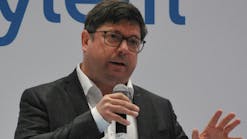Martin Bureau, a vice president for innovation with environmental services firm ALTRA | SANEXEN, took the stage at WEFTEC in New Orleans Monday to detail the water scarcity issues the world faces. Details such as the fact that 2.1 billion people around the globe have no access to drinking water every day.
“So, the challenges we face are formidable, but so is our resolve,” said Bureau, who is also head of the PFAS Centre for Excellence for ALTRA.
The company provides solutions for the renewal and rehabilitation of drinking water infrastructure, the manufacturing of fluid transportation products, as well as the treatment of industrial effluents and removal of per- and polyfluoroalkyl substances, or PFAS. The company’s PFAS technology removes up to 99% of forever chemicals from leachate from facilities like landfills. The ALTRA technology can treat 25 million gallons per year of leachate on this site, according to company officials.
In his WEFTEC presentation, Bureau said four out of 10 people in the world are affected by water scarcity. And while climate change and disasters like droughts and floods have exacerbated the issue, he said, “let’s face it. It's not the drought that is causing the problem. It's the decades of underinvestment in the water systems. And the poor management and the poor maintenance.”
These problems have led to cities like Jackson, Mississippi, seeing taps run dry for 160,000 residents.
Bureau said Mexico City, with a population of 8.8 million, could run out of water by December.
Bureau added that he spoke with a representative from Houston, who said the city of more than 5 million people could soon face the same issues as Jackson.
That need for water infrastructure is driving innovation in the private sector, Bureau said, but as the world becomes more digital the water scarcity issue worsens.
For example, the average data center uses about 300,000 gallons of water per day. In a couple of years, according to Bureau, data centers could account for 250 billion gallons of water consumed annually.
Bureau said data centers have surpassed the worlds oldest industry, textiles, in terms of water consumption.
Bureau pointed to one small city in Oregon with a small data center that represents a third of the city’s water consumption.
“Those data centers are becoming water vampires,” he said.
Bureau said industry leaders such as Amazon, Meta and Google need to do more to bring those water consumption numbers down.
“They must take a stand,” he said.
Another industry further stressing the world’s water reserves is the electric vehicle market. While Bureau stressed that he supports electrical vehicles, he said, manufacturing a single EV battery consumes nearly 160,000 gallons of water.
He said that with government mandates pushing car manufacturers to make more EVs, it’s possible to see as many as 10 million electric vehicles in the near future. That number would equate to the consumption of about 2 trillion gallons of water. Further worsening the issue, he said, those EV batteries are often manufactured in water-scarce regions like Nevada or Chile.
Bureau said public-private partnerships, with institutions like universities and water utilities, will be instrumental in helping solve the water scarcity issues the world faces.
“We need a new approach,” he said.
